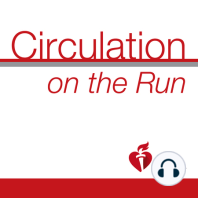25 min listen
Circulation March 13, 2018 Issue
ratings:
Length:
17 minutes
Released:
Mar 12, 2018
Format:
Podcast episode
Description
Dr Carolyn Lam: Welcome to Circulation on the Run, your weekly podcast summary and backstage pass to the journal and its editors. I'm Dr. Carolyn Lam, Associate Editor from the National Heart Centre and Duke National University of Singapore. Have you ever wondered, which is better for heart health, low calorie vegetarian or a Mediterranean diet? Well, this week's feature paper provides some answers with a very intriguing discussion coming right up after these summaries. The first original paper this week suggests that human fat pools are not the same and in fact are highly diverse in their response to lifestyle interventions during weight reduction first author Dr. Gepner, co-corresponding authors Dr. Shai from Israel and Dr. Stampfer from Boston aim to assess whether distinct lifestyle strategies could differentially affect specific body adipose depos. They performed at 18-month randomized control trial among 278 sedentary adults with abdominal obesity or dyslipidemia in an isolated work place with a monitored, provided lunch. Participants were randomized to an isocaloric low fat or a Mediterranean low carbohydrate diet with or without added moderate physical activity. The overall primary outcome was body fat redistribution and the main specific endpoint was visceral adipose tissue. The authors further followed the dynamics of different fat depos by magnetic resonance imaging. They found that Mediterranean diet was superior to the low fat diet in mobilizing specific ectopic fat depos such as visceral, hepatic, cardiac and pancreatic fats. Exercise had an additional independent contribution to visceral fat loss. Long term persistent moderate weight loss inadequately reflected the significant beneficial effects of diet and exercise on the fat depos. Independent of weight loss, visceral and hepatic fat reduction was mainly associated with improved lipids profile whereas deep subcutaneous fat loss was associated with improved insulin resistance and superficial fat loss was neutral. In other words, two distinct patterns were identified, a differentially responsive depo that was sensitive to the type of intervention, and those recites mostly directly related cardiometabolic health and a uniformly responsive depo, which corresponded only to weight loss per se irrespective of the intervention. Overall, these results suggest that more specific strategies for weight loss may be considered to treat distinct organ specific fat depos in the management of cardiometabolic risk. Current guidelines recommend nonvitamin K antagonist oral anticoagulants or NOACs in patients with nonvalvular atrial fibrillation as these drugs have several benefits over the vitamin K antagonists but do these benefits remain when NOACs have to be combined with aspirin therapy? Well co-first authors Dr. Bennaghmouch and de Veer, corresponding author Dr. ten Berg and colleagues from the Netherlands provided a meta analysis comparing NOACs and Vitamin K antagonists in more than 21700 patients with atrial fibrillation who are treated with concomitant aspirin therapy. NOACs were found to be more effective in terms of stroke or systemic embolism reduction as well as vascular death reduction and as safe as vitamin K antagonist with respect to major bleeding. NOACs were in fact safer with respect to the reduction of intracranial hemorrhage. Thus, these authors found that NOACs were an effective and safe alternative as compared to vitamin K antagonists in atrial fibrillation patients treated with concomitant aspirin therapy. The next study shows that an integrative approach using genomics and proteomics has the potential to identifying new biological pathways for biomar
Released:
Mar 12, 2018
Format:
Podcast episode
Titles in the series (100)
Circulation November 1, 2016 Issue: Dr. Carolyn Lam: Welcome to Circulation On The Run, your weekly podcast summary and backstage pass to the journal and its editors. I'm Dr. Carolyn Lam, Associate Editor from The National Heart Center and Duke National University of Singapore.... by Circulation on the Run
